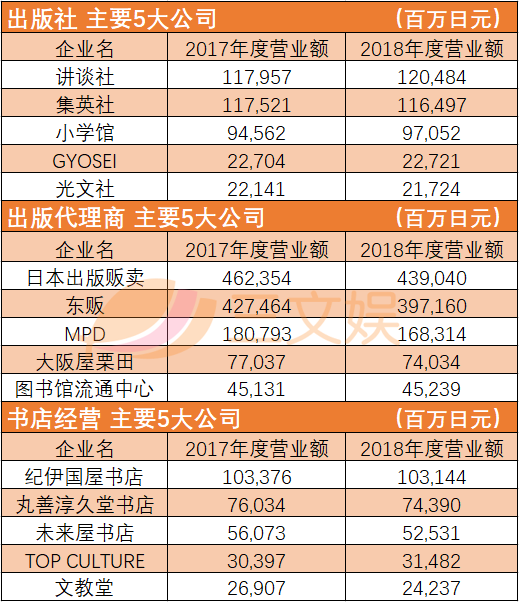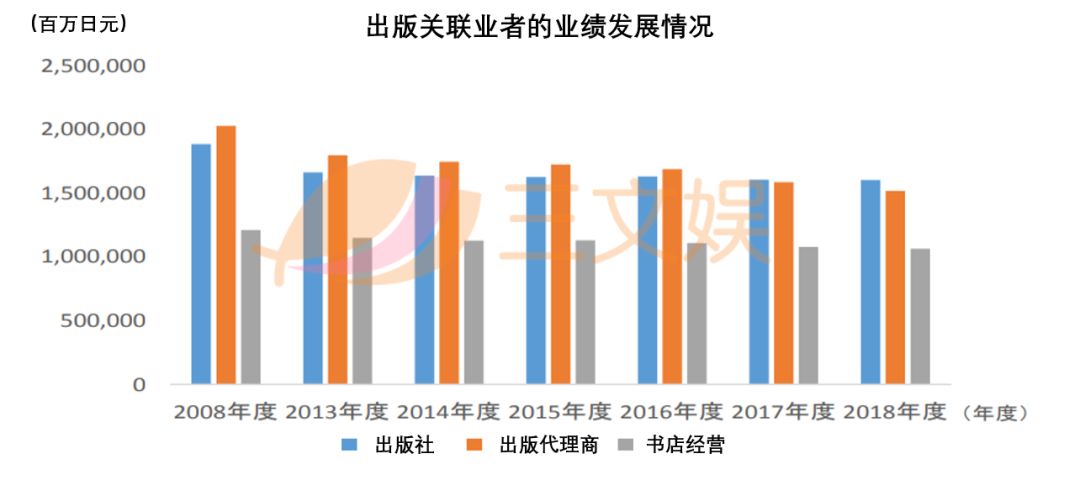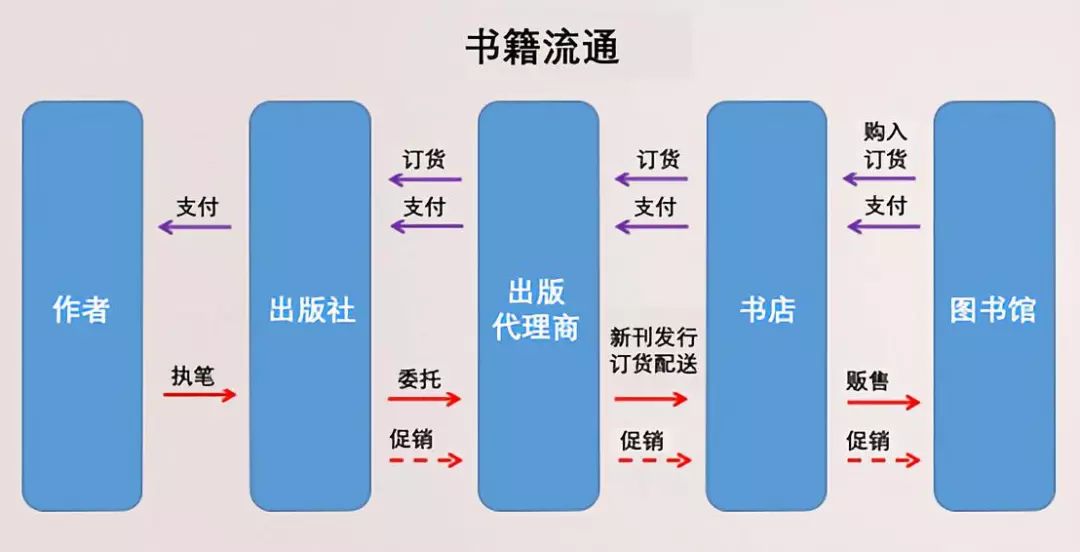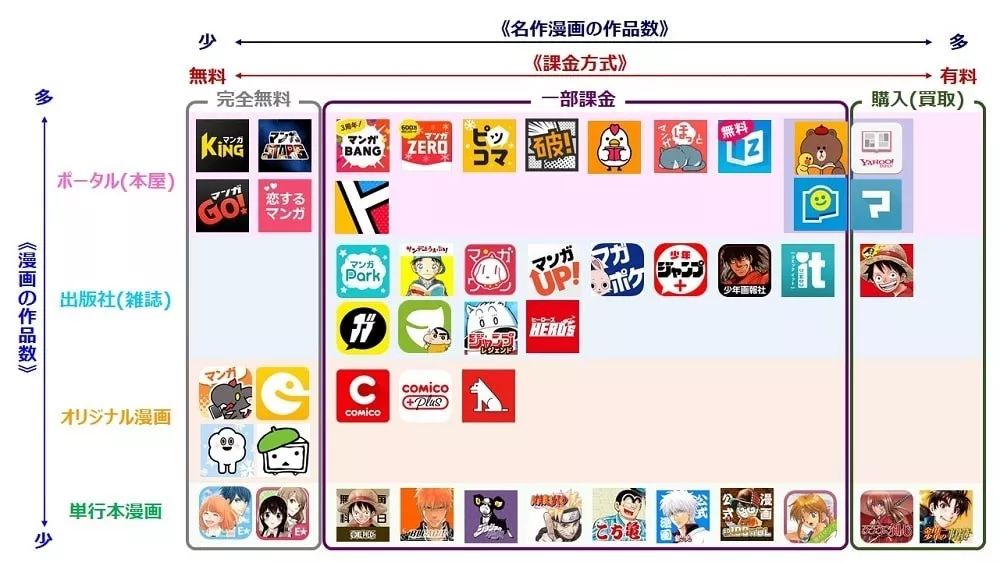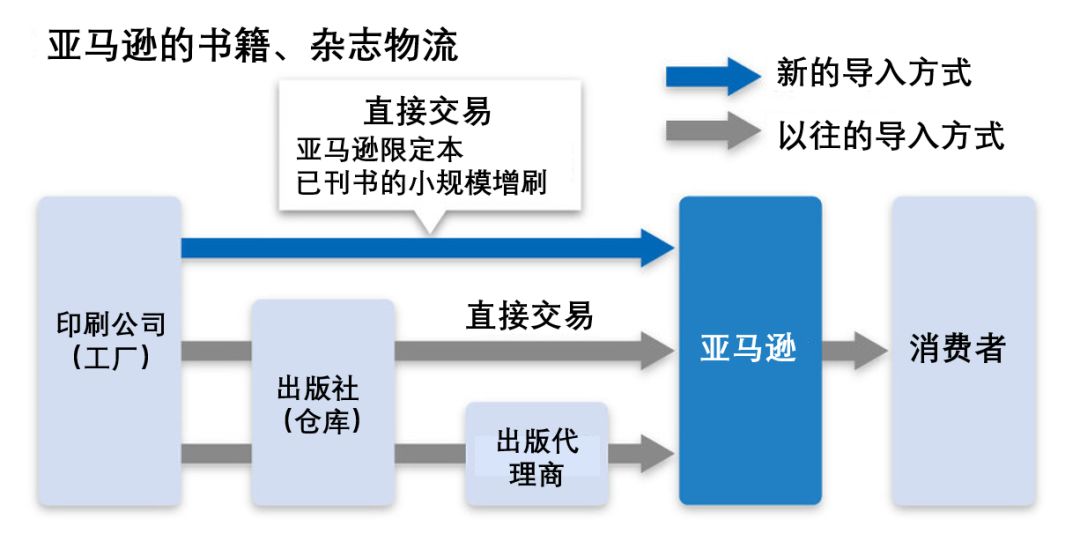In 10 years, the turnover of 3,740 Japanese publishing affiliates fell by 18%. Is e-book a life-saving straw?
Editor’s note: This article is from WeChat public account “Sanwen Entertainment” (ID :hi3wyu), author Wind.
In 2018, the turnover of 3,740 publishing affiliates in Japan was 4,184,839 million yen, a drop of 18% compared with 1,521,615 million 10 years ago. It is not optimistic.
Recently, the Empire Database published a report on the “Publicity Survey of Publishers”. The report draws statistics from 4,734 companies that use Japanese publishing houses, publishing agents, and bookstores as their main business, and analyzes their total turnover and corporate facts.
In 2018, the turnover of 3,740 publishing affiliates in Japan was 4,184,839 million yen, which was converted into RMB 278.2 billion, and the turnover of each company was less than 75 million yuan.
The estimated sales of paper publications in 2018 reached 1,2,921 billion yen, a decrease of 5.7% year-on-year. This figure has been declining for 14 consecutive years.
What is the development prospect of the Japanese publishing industry? How to save the falling paper market?
The total income of the publishing industry continues to decline, and e-books are saving the market?
First, according to data published by the National Publishing Association of Japan, the estimated sales of paper publications in 2018 reached 1 trillion 292.1 billion yen (the following amounts are in yen), year-on-year It has decreased by 5.7%, and this number has been declining for 14 consecutive years. Among them, the magazine’s sales have been falling for 21 consecutive years, reaching 593 billion in 18 years, a year-on-year decrease of 9.4%. Overall, the paper publishing market is continuing to experience a severe decline.
From the performance of the five major companies operated by publishing houses, publishing agents, and bookstores, the turnover of the publishing giants in the 18th year was relatively stable, and most of the publishing agents and bookstores were in a reduced state.
Next, let’s look at the operations of affiliates in the 18th year. This time, the Empire Database counted 3,740 publishing affiliates that “opened 08 to 18 years and 13 to 18 years of turnover.”
These three industries add up, and the total turnover of 18 years is (41884.39 billion) compared with the (51256.15 billion) in 2008 10 years ago. 18%, not optimistic. The publishing agency has dropped by 25.1%, which is the most severe among the three industries.
4,724 publishing affiliates, 4,724 companies announced their 18th annual turnover . Among them, the annual income of “less than 100 million” is the most, with 2,438, accounting for 51.6%. Followed by “100 million or more, less than 1 billion”, there are 1,794, accounting for 38%. In terms of all kinds of industries, small-scale enterprises still account for the majority, especially bookstores, and the proportion of “less than 100 million” has reached 57.4%.
From the geographical location of the 4,734 companies, the number of publishing affiliates in Tokyo was 1,835, accounting for 38.8%. Followed by Osaka Prefecture, 222, accounting for 4.7%. From the perspective of the three industries, except for Tokyo, the publishing companies are mostly distributed in Osaka Prefecture, and the publishing agents are mostly distributed in Aichi Prefecture. The bookstores are mostly distributed in Hokkaido.
So, what happened to the Japanese publishing industry in 2019?
After May this year, Hokkaido has been banned by the BOOK JAM K&S, which has been operating the BOOK JAM, and the famous bookstores with many years of history, and many small and medium-sized bookstores have closed down. In addition, the Japan Publishing Agents Association (Japanese:Japan Publishing Association) was also notified in March this year, due to the lack of manpower and other logistics aspects, Kyushu, China Magazines and books will be delivered one day later than the day of sale. How many of these events will affect consumers’ desire to buy books.
In summary, in the 18th year, whether it is a publishing house, a publishing agent or a bookstore operator, its total income is decreasing. The gradual reduction of the paper media market has affected the performance of related industries to some extent. Although there has been no disruptive change in the industry environment, the decline in performance has also narrowed.
In the general environment of the decline of the publishing industry, what solutions does the publishing industry affiliates have to deal with?
The paper media market is sluggish, how do upstream, downstream and downstream companies respond?
In recent years, the paper media market has been sluggish, and the e-book market has become a major trend, and traditional publishing affiliates are bound to be affected. However, companies in different locations in the Japanese publishing industry chain are affected differently.
The most upstream of the Japanese publishing industry chain is the owner of the content, the author of the book and the publisher. In this megatrend, the author is less affected. After all, he does not participate in the publishing work, whether it is signed with the publisher or the e-book platform.
Translated from Fujitsu CS Research Materials
The publishing house that does not have digital business only by paper-based books will have a greater impact. Therefore, many traditional publishing houses are now developing e-book platforms. For example, in terms of comics, Shueisha launched the app “Junior JUMP+”, the elementary school pavilion launched the app “MangaONE”, SQUARE ENIX launched the app “MangaUP!”, and Baiquanshe launched the app “MangaPark”…
Japanese Manga APP
Affected by the huge impact of the e-book market, the most influential is the middle and downstream of the traditional publishing industry, that is, publishing agents and bookstores. It is difficult for content holders to continue to develop through transformation.
Japanese publishing agents have actually appeared in Japan during the Meiji period, and publishing agents have become an integral part of the Japanese publishing industry. Publishing agents are middlemen of publishers and retail bookstores, responsible for purchasing (books, magazines, etc.) from the publishing house and then wholesale to bookstores. In recent years, the Amazon platform has gradually circumvented publishing agents and purchased directly from publishers. This is undoubtedly a declaration of war with publishing agents.
Because the days of publishing agents are not good year after year, they are actively looking for sustainable development. In April of this year, the two head publishing agencies, Japan Publishing and Selling, announced the cooperation, and improved logistics efficiency with a comprehensive base. However, this seems more like a helpless move in the big environment. Even the head companies are starting to warm up, so other smaller companies are even worse.
What’s interesting is that there are also e-book agents in the e-book market in Japan. They are among the e-book platforms and content providers, and their location is equivalent to the publishing agents of the traditional publishing industry. At present, Japan’s relatively large e-book agents include MEDIA DO and MobileBook.jp. MEDIA DO’s largest customer is the most popular electronic comic platform “LINE Manga” in Japan. MEDIA DO has also developed rapidly in recent years. Perhaps e-book agents are also one of the transformational paths for the sustainable development of traditional publishing agents.
But in recent years, some e-book platforms launched by Internet companies are trying to bypass agents and get copyright directly from content holders. This of course will also affect e-book agents.
Let’s talk about bookstore operations. Under the impact of the e-book wave, many bookstore companies have gone bankrupt. The Wenchao Group, which is mainly engaged in the chain bookstore business, has to terminate its listing due to insolvency. In June of this year, it applied for the business regenerative ADR (non-litigation dispute resolution procedure) and plans to close it. Some loss shop.
There are many examples of such mismanagement, and it is obvious how big the impact of the Japanese physical bookstore industry is. However, there are also bookstores that can stand up in this wave and explore new ways of doing business. Most of the Japanese bookstores that have been operating well in recent years have a feature that goods are no longer limited to books and magazines, and they are also sold in various commodities such as groceries and stationery.
Similarly, this kind of bookstore is very popular among young people. The Japanese squatter bookstore and the Eslite life from Taiwan to Japan have achieved good results. Perhaps this is also a good direction for innovation in the Japanese bookstore industry.
